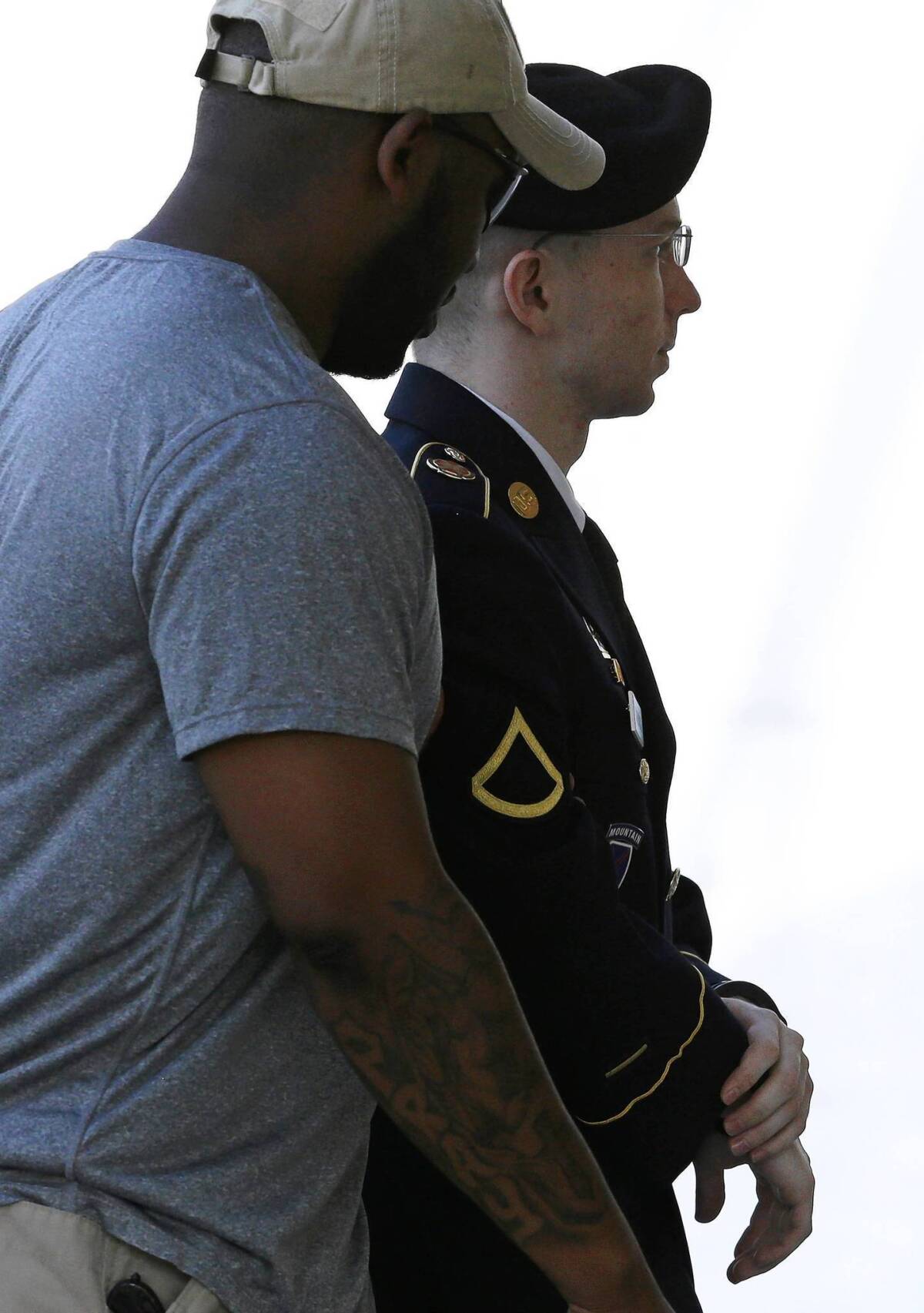Judge declines to toss most serious charge in Bradley Manning case

- Share via
FT. MEADE, Md. — The judge in the court-martial of Army Pfc. Bradley Manning refused to dismiss the most serious charge against him Thursday, dealing a blow to his hope of emerging from the trial as a whistle-blower concerned about government abuse rather than a disgruntled soldier driven to assist Al Qaeda.
The decision by Col. Denise Lind upholding the charge of aiding the enemy signaled that she may be preparing to find Manning guilty. This could mean the 25-year-old — who gave the anti-secrecy organization WikiLeaks more than 700,000 U.S. intelligence files, videos and diplomatic cables — could spend the rest of his life in a military brig with no chance of parole.
The judge said the government had provided evidence that established Manning “actually knew he was dealing with the enemy” by providing the material to WikiLeaks that he knew would be posted on the Internet and made available to Al Qaeda and other terrorist organizations. “He was knowingly providing information to the enemy,” she said.
Several legal and civil rights experts said the judge’s decision would have “far-reaching implications” for future leakers or would-be whistle-blowers.
“You don’t need specialized intelligence training to know that terrorists use the Internet,” said Elizabeth Goitein, co-director of the Liberty and National Security Program at the Brennan Center for Justice. “By this logic, any military officer who discloses information to the media or posts it on the Internet could be charged with aiding the enemy. That’s not consistent with the purpose of the law, and it could have a dramatic, chilling effect.”
Widney Brown of Amnesty International said Manning had no “general evil intent” in sharing the material with WikiLeaks despite the government’s determination to keep him in prison for life. Rather, she said, Manning was more interested in informing the public about military and government abuses than sympathizing with Al Qaeda.
“The charge should be withdrawn,” she said. “This makes a mockery of the U.S. military court system.”
The material Manning provided to WikiLeaks gave the public an unprecedented look inside U.S. military operations in Iraq and Afghanistan and a window into how the administration views and treats its allies overseas.
Closing arguments in the case could come as early as Friday.
The judge also refused to dismiss computer fraud charges against Manning, ruling there was enough government evidence to indicate he overstepped access restrictions when he downloaded material onto his external hard drive and then transferred it to WikiLeaks.
Manning already has pleaded guilty to 10 lesser charges for mishandling classified material, and that alone could get him 20 years in prison. Even had the judge tossed out the aiding the enemy charge, he still would have faced 154 years in prison if convicted of all the other offenses, including stealing government property.
The Manning case is being closely watched by supporters of Edward J. Snowden, a former National Security Agency contract analyst who leaked details about secret telephone and Internet surveillance programs.
Hiding for weeks in a Moscow airport zone, Snowden has been charged with espionage in federal court in Alexandria, Va. Like Manning, he has fashioned himself as a whistle-blower, more concerned about warning the public of government abuse than trying to harm national security.
Though the Snowden case would be tried in a civilian court rather than on a military base, federal prosecutors nonetheless would probably insist his leaks harmed national security, which by its nature helps the enemy.
For Manning, the aiding the enemy charge is tantamount to an espionage accusation in civilian court.
Military prosecutors presented evidence in the Manning court-martial that showed some of the material posted on the Internet by WikiLeaks and reported by news outlets reached then-Al Qaeda leader Osama bin Laden.
They said Manning was given extensive lessons and trained other soldiers on the importance of safeguarding classified material and that he “should have known” and in fact “did know” that the enemy would benefit from the disclosures.
“He knew exactly what he was doing in exposing that information,” said Capt. Angel Overgaard. “The enemy was looking for this specific information.”
But Manning’s lead attorney, David L. Coombs, said his client never had any “actual knowledge” the documents would assist terrorists. “The Army does not know whether the enemy goes to WikiLeaks,” Coombs told the judge. “We simply do not know.”
More to Read
Sign up for Essential California
The most important California stories and recommendations in your inbox every morning.
You may occasionally receive promotional content from the Los Angeles Times.













